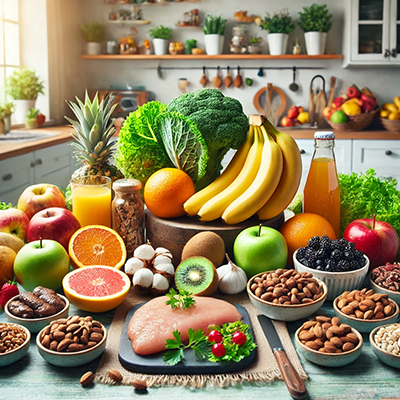Contents
Navigating dietary choices can be a challenge when dealing with gallstones. You may wonder, “Can I eat bananas with gallstones?” Bananas are a popular fruit known for their rich nutrient profile. They offer a host of digestive system benefits. But how do they interact with gallstones? Let’s explore the relationship between bananas and gallstones and how this fruit might influence your digestive health. Whether you’re a gallstone sufferer or simply interested in maintaining a healthy gallbladder, this information is for you.
Understanding Gallstones and Your Diet

Gallstones are hard deposits that form in the gallbladder. They can be as small as a particle of sand or a golf ball. These stones can cause pain and complications if they block the bile ducts. Symptoms may include severe abdominal pain, jaundice, and even pancreatitis. Diet plays a substantial role in gallstone formation and management. Certain foods can promote gallstone formation, while others can help prevent it. Here are some dietary causes that can influence gallstone development:
- High-fat and high-cholesterol diets
- Rapid weight loss
- Low-fiber diets
Understanding these issues can help you make informed dietary choices. For example, you can include bananas in your diet if you have gallstones.
The Nutritional Profile of Bananas
Bananas are loaded with essential nutrients. They are high in fiber, vitamin C, and potassium. Bananas contain both soluble and insoluble fiber. Soluble fiber can help lower cholesterol levels, while insoluble fiber aids digestion. Bananas also contain antioxidants like dopamine. These compounds can help decrease inflammation and oxidative stress in the body. Given their nutritional profile, bananas can be a healthy addition to most diets. However, their impact on gallstones is a topic that requires further exploration.
Bananas and Digestive Health
Bananas can significantly promote digestive health. Their high fiber content aids in steady bowel movements and helps maintain a healthy gut. The soluble fiber in bananas can slow digestion, helping you feel full longer and prevent overeating. On the other hand, the insoluble fiber in bananas can add bulk to your stool, helping inhibit constipation and promote regularity.
In addition to fiber, bananas contain starch that can aid the good bacteria in your gut. This can help preserve a healthy gut microbiome, which is crucial for overall digestive health. However, bananas’ impact on gallstones may vary, mainly dependent on individual health factors and dietary habits.
How Bananas May Affect Gallstones

Bananas’ high fiber content may positively impact gallstones. Dietary fiber is believed to decrease the risk of gallstone formation. This is because fiber can help control your weight by making you feel full. It can also help control your blood sugar levels, which are important in preventing gallstones.
Moreover, bananas’ potassium may help balance your body’s electrolytes. However, it’s important to remember that bananas can be part of a gallstone-friendly diet but should not be the only solution. A balanced diet and vigorous lifestyle are fundamental in managing gallstones.
Here are some ways bananas may affect gallstones:
- High fiber content may reduce gallstone risk
- Potassium may support digestive health
- Can be part of a balanced, gallstone-friendly diet
- Should not be relied upon as the only solution for gallstones
Bananas can be enjoyed as snacks, smoothies, or included in meals. However, portion control is essential. While bananas are beneficial, consuming too much can lead to excessive calorie intake. Here are some ways to integrate bananas into your diet:
- As a snack between meals
- Added to smoothies for additional fiber and nutrients
- Included in meals, such as oatmeal or salads
Remember, a balanced diet is critical. Bananas should be part of a varied diet that includes other fruits, vegetables, lean proteins, and whole grains.
Other Beneficial Foods for Gallstone Conditions
Other foods, apart from bananas, can be beneficial for gallstone conditions. These foods are rich in fiber, low in fat, and promote overall digestive health.
Here are some examples:
- Whole grains like brown rice and oats
- Lean proteins consisting of chicken, fish, and tofu
- Other fruits and vegetables, especially those high in fiber
Remember, it’s not just about adding beneficial foods to your diet. It’s also about maintaining balance. Always consult with a healthcare professional before making significant dietary changes.
Foods and Habits to Avoid with Gallstones
While some foods can benefit gallstone conditions, others might exacerbate the problem. It’s crucial to know what to avoid when you have gallstones.
Here are some examples:
- High-fat foods, including fried foods and fatty meats
- Foods high in cholesterol
- Rapid weight loss diets
Avoiding certain foods and habits is essential. For instance, skipping meals can increase gallstone risk. Always consult with a healthcare professional before making significant dietary changes.
When to Consult a Healthcare Professional

While diet is a significant factor in managing gallstones, it’s not the only factor to consider. If you have gallstones, you must check with a healthcare professional. They can offer customized assistance based on your health history and condition. They can also monitor your situation and adjust your treatment plan as necessary.
Remember, significant dietary changes should always be made under the guidance of a healthcare professional. This ensures that you’re managing your condition safely and effectively. In addition, regular medical check-ups are essential for individuals with gallstones. These check-ups help monitor the condition and prevent complications.
Health Disclaimer: The information on this website is for educational uses only and is not a substitute for professional medical advice. Always consult an authorized healthcare provider for any health concerns before using any herbal or natural remedy. We do not establish, treat, cure, or prevent any disease. Reliance on any material from this website is solely at your own risk. We are not responsible for any adverse effects resulting from the use of information or products mentioned on this website.
References
- National Institute of Diabetes and Digestive and Kidney Diseases (NIDDK): https://www.niddk.nih.gov/health-information/digestive-diseases/gallstones
- Nutrients Journal (Study): https://www.mdpi.com/2072-6643/12/1/209/htm
- National Institutes of Health (NIH): https://www.ncbi.nlm.nih.gov/pmc/articles/PMC4144564
- NIDDK: https://www.niddk.nih.gov/health-information/digestive-diseases/gallstones/symptoms-causes
- USDA FoodData Central: https://fdc.nal.usda.gov
